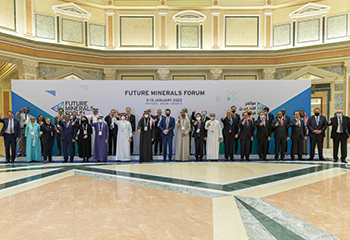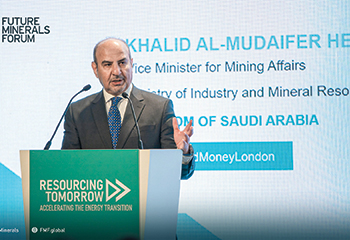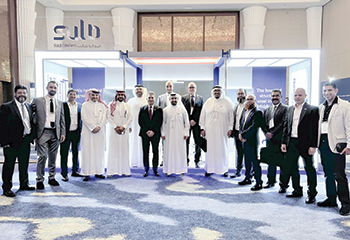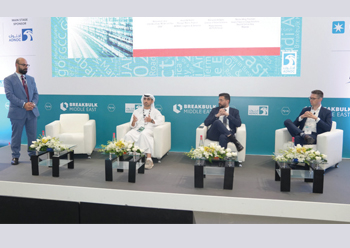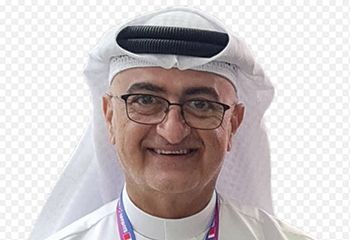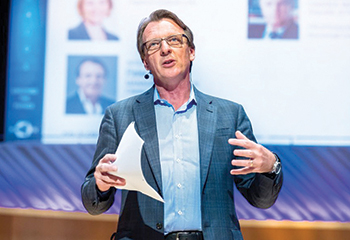
 Peter Bryant
Peter Bryant
Sitting on untapped mineral reserves of $1.3 trillion, Saudi Arabia can be the change that the world needs, says minerals and metals expert Peter Bryant, chair of both the Development Partner Institute and Clareo.
“It has a unique opportunity to set the agenda and lead by example, in embracing new mining techniques and extending a caring image, as the industry re-connects with communities and stakeholders, and convincing them of the fundamental benefits that minerals and mining bring,” Bryant said ahead of the second Future Minerals Forum (FMF) in Riyadh from January 10 to 12, 2023.
Bryant argues that mining must be more of a “giver” than a “taker”. It must boldly take bigger steps to show communities, governments and stakeholders how the industry benefits societies. It must develop trust with local communities, and engage specifically with them, rather than adopting a “one size fits all” approach. There’s no time to lose.
“The clock is ticking and climate change needs to be stopped in its tracks,” he said.
ACADEMIC REPORTS
 |
|
Sustainability in mining techniques is called for |
Meanwhile, the Forum is publishing academic reports for the first time, which will provide insights into future of mining and how leading think tanks say the industry must reform.
Bryant’s is one of the messages championed in a hard-hitting report to be presented in a keynote speech to 7,500 delegates (in-person and virtually).
Bryant – who has spoken at the Cop26, CERAweek 2022 and FMF 2022 conferences – argues that mining must reimagine itself in fundamental ways: how it extracts minerals and metals. He also argues that the sector must develop new ways to explain its role in fighting climate change and contributing to the goal of net zero (where greenhouse gases going into the atmosphere are balanced by their removal).
The paper urges the minerals and metals industry to continue in-depth research to boost performance and sustainability in mining techniques, as well as to reduce the impact on the environment.
BRANDING
In terms of mining’s branding and perception, the paper examines how global mining suffers from an image problem, and how it is up to the industry to educate the public and the green lobby about how they see it. It needs a shift in thinking – one which stresses the ways in which the industry presents itself. The emphasis, the paper argues, should be on taking a long, hard look at its image, and reposition itself, and react immediately to any criticism of it, continue speaking to all stakeholders and convince the public that mining can help fight climate change.
“While consumers and environmentalists increasingly demand clean energy, many do not realise that the raw materials needed to power their electric cars and trucks, smartphones and rechargeable batteries, all come from mining,” said Bryant. “Without copper, for example, windfarms cannot operate, electric vehicles cannot start, and microchips would not exist, and computers would not work. Clean energy technologies such as solar panels, wind farms, and electric vehicles require four to ten times more mineral resources than their fossil fuel-based counterparts.”
Bryant points to several examples from around the world of how initially skeptical communities have engaged with different sectors including mining to create vibrant partnerships where all sides benefit. He points to the indigenous Maori community in New Zealand and the success of a 40-year-old programme (conducted under the Maori Economy Investor Guide) to explain to and convince the local communities of the resilience and benefits of mining. It led to jobs, community prosperity, new health centres, schools, and “downstream” activities like manufacturing, using the minerals and metals extracted, which are then processed industrially. As a result, substantial inward investment has flowed into the communities. In South Africa, the government has spearheaded a cross-sectoral, multi-partner development initiative between Anglo American, the South African Council of Scientific & Industrial Research (CSIR), Exxaro (a Black-empowered minerals company), Zutari (an engineering and advisory firm), and the faith-based charity World Vision South Africa.
SOCIAL IMPACT
They maximise positive social impact in the mining communities in several provinces like Limpopo. Their aim is to establish inclusive, collaborative, cross-sectoral platforms, initiatives and partnerships to achieve socio-economic impact through public-private partnerships. The key to this is agreeing common goals, and setting out a clear and transparent pathway ahead.
This approach is now being replicated in Peru, Chile, and Brazil.
According to Bryant, Saudi Arabia clearly understands the insights and lessons to be gained from similar successful strategies. It should champion and catalyse a series of wide ranging discussions with stakeholders across the board, in order to crystallise a shared vision and a vital roadmap – a theme likely to be discussed in detail at the Ministerial Roundtable, which launches the Future Minerals Forum.

